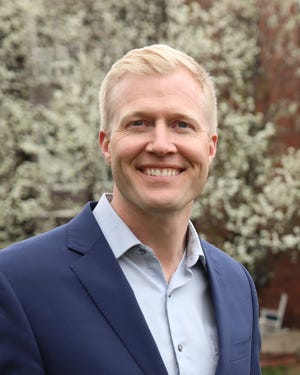Opinion: What results do gifts to Iowa legislators bring?
Campaign contributions and charcuterie plates given by special interest groups come at the expense of everyday people who lack the resources to compete.
- Dr. Austin Baeth is a Des Moines physician and a state representative.
It is said, “There ain’t no such thing as a free lunch.” The concept first arose in the American West in the late 1800s when saloons would offer free extra-salty lunches to patrons when they bought a beer. Saloon owners had observed that the high-sodium meal helped maintain their customers’ thirst for more booze.
It’s my duty to report that we state lawmakers are well-fed by the lunches — both literal and figurative — of special interest groups at the Capitol. In fact, as I write this, I sweep my keyboard of crumbs from my peanut butter cookie that was given to me by Decoding Dyslexia Iowa in the Capitol rotunda. Now, this parent-driven special interest group has an honorable mission of promoting reading programs for children with dyslexia. I therefore don’t feel so guilty accepting the nonprofit’s cookie as I chat with Executive Director Katie Greving, herself the mother of a child with dyslexia.
But the handouts go beyond cookies. Whether it’s a midday charcuterie from the gaming industry or the biofuel sector’s dinner and cocktails at the Hilton, this “free” fare is offered in and around the Capitol with such frequency, a legislator’s weekly caloric needs can be had without spending a personal penny. It takes little imagination to connect the crumbs from a seemingly innocuous breakfast sandwich to the power that interest groups and their lobbyists seek to wield on state lawmakers. It’s quite clear the lobby ascribes to the belief that the way to a (wo)man’s heart is through his or her stomach.

The shame is that most politicians hunger for more than food but for power. And when the key to a successful campaign is a well-fed bank account, special interest groups are happy to provide more than charcuterie. In the 2022 election for state level races in Iowa, lobbyists gave $21.6 million to candidates’ campaign accounts. Whether the money influences the decision of a lawmaker or merely helped to elect a candidate who already shared a group’s belief, we cannot know for sure.
In the field of medicine, however, the evidence is clear that even small gifts like a box of doughnuts dropped off by a drug rep have a demonstrable effect on a doctor’s prescribing habits. Whether it’s conscious or subconscious persuasion, the giver of a glazed doughnut could decide whether one receives Viagra or Cialis.
This year’s top individual donor to the Iowa Legislature was Richard Stark, a philanthropist whose foundation frequently promotes Catholic school programs. Is it possible that any Republican recipients of his $398,900 were moved to pass a wildly unpopular private school voucher bill as a result?
From 2017:Special interest groups spend big at Iowa Capitol
There is no such thing as a free lunch. Campaign contributions and charcuterie plates given by special interest groups come at the expense of everyday people who lack the resources to compete. If one ever wonders why their government doesn’t seem to be working in their best interest, look no further than this mismatch of influence. In 2010, the U.S. Supreme Court agreed that campaign money is speech but erred in ruling that rich people should get to speak louder. We can never fully fix our political system until this ruling is overturned, but we can begin to make smaller repairs. I will soon be submitting bills to the Iowa House to help rein in the limitless campaign spending in our state.
It’s important that we remain watchful of how campaign money might be influencing actions at the Capitol, and that we expose it for the public to see. Campaign finance reform is not a sexy topic and requires nuanced explanation. But until we can help more people see that their government isn’t listening to them because money speaks louder, there will never be enough political pressure to change the rules of the game.
Footnote: For the record, I typically avoid the free food at the Capitol unless I need a cookie.

Dr. Austin Baeth is a Des Moines physician and a state representative.